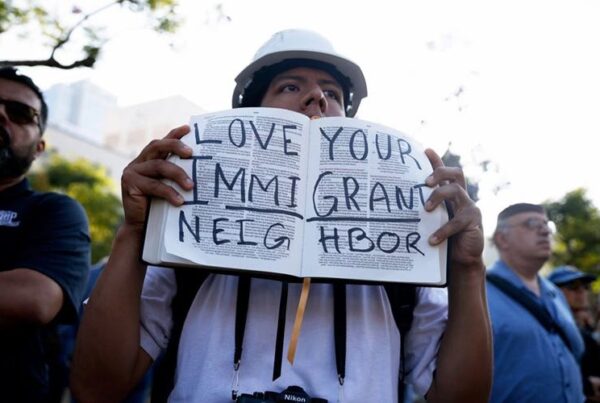Bigger than the Ballot is a Chasing Justice series about how to collectively work toward the love, justice and peace of Jesus in the public sphere. In this two-part blog series, Katie Nguyen Palomares explores what it looks like to seek shalom together in the midst of division and disagreements. Check out part one: Can We Disagree and Experience Shalom?
Most people would agree that a world as-it-should-be is one where life is prioritized: Where children are not killed by guns; where abuse of all sorts not only goes un-tolerated but is completely eradicated; where no harm is done and goodness reigns.
However, for Christians in this country, things get complicated because, often, we disagree about how to get there.
Children’s lives are on the line when we settle for civility and a lack of conflict instead of engaging and fighting for shalom on earth: a restoration and experience of wholeness for all creation that comes with God’s Kingdom.
Especially as we navigate another presidential election season, we must keep this collective longing of the world-that-should-be ahead of us. Not because we all agree on how to get there, but because we have a shared guide.
Jesus constantly pointed us toward a world of redemption, grace, justice, and righteousness for all–especially the marginalized.
And as we keep this “world as it should be” shalom in front of us, we also need to remember that none of us–Christian or not–has it completely figured out. We need Jesus, who made himself available to all of us.
Jesus As Our Model
Jesus intentionally went out of his way to meet with a woman in Samaria, who other Jews of his day would have said was culturally, socially, and racially “beneath” him. She was a woman who, on the outside, lived a life based off of tenets which would cause disagreement. But that didn’t hinder Jesus.
Jesus: who prioritized the orphans, the widows, and the sojourners. Jesus: who constantly reminded his followers that living with him involved not only personal sacrifice, but actively prioritizing their Gentile, Jewish, Samaritan, mixed race, queer, outcast and marginalized neighbors above themselves.
In this story, we see Jesus entering into the context of the women’s lived experiences, without judgement, and caring for her heart and soul.
Jesus calls everyone to care for each other as family, whether that’s someone you disagree with or, for people groups who have histories of violence, the very people who enacted racial, social, and cultural violence against one another.
Matt’s story of shalom, that I mentioned in part one of this series, reminds me that we as humans lack any internal sense that alerts us to when we are “right” or “wrong” about any given topic. Meaning, we all have blindspots, and we all need the perspectives of others.
And that means seeking after not only an embodied shalom, but also learning how to engage in disagreements well—especially when lives are on the line. Learning, listening, being open to correction and even changing our minds is not an option—it’s a necessity.
How Do We Practice Shalom?
Embodying shalom is not arguing the other into submission or seeking the high ground of being “right.” It means working with our friends and working with our enemies—people on “the other side”—toward collective wholeness.
It means valuing the life and human dignity of all in everything that we do.
It means communally figuring out how to work, vote, push, and crawl our way toward the world-that-should-be. Together.
When Jesus subverted the systems of empire through his death and resurrection, he didn’t leave us with blueprints for maintaining systems of civility.
He left us with a higher bar in mind: to love God and bring his Kingdom shalom to earth by advocating for, listening to, and uplifting the oppressed, the disenfranchised, and the marginalized.
“And what does the Lord require of you
But to do justice, to love faithfulness, and to walk humbly with your God?”
– Micah 6:8

Katie Nguyen Palomares is a Mixed Vietnamese/White activist, writer, and preacher currently living in Austin, TX. She serves as the Program Manager for Kingdom Capital Network, supporting primarily Black & Brown small business owners to make a Kingdom impact in their communities through their work. She also serves on the Digital Team for Chasing Justice and co-hosts The Beauty In-Between podcast with her husband. She earned her M.A. in Christian Leadership from Dallas Theological Seminary and her B.A. in English with teacher certification from Texas State University.
The views and opinions expressed on the Chasing Justice Blog are those of the authors and do not necessarily reflect the official policy or position of Chasing Justice. Any content provided by our bloggers or authors are of their opinion and are not intended to malign any religion, ethnic group, club, organization, company, individual or anyone or anything.







